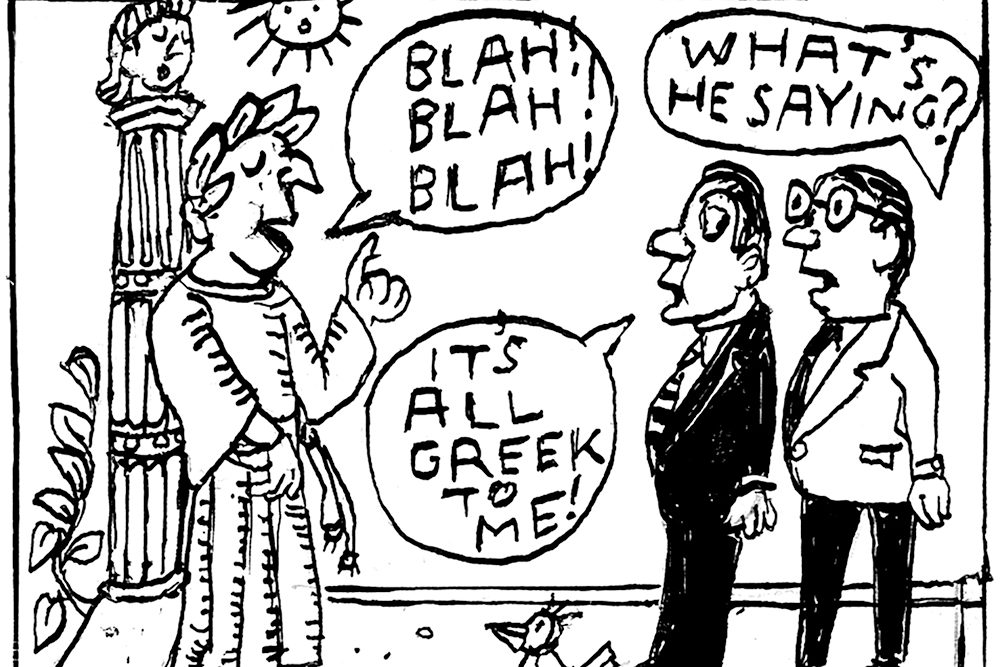Duolingo claims that it is “the world’s best way to learn a language.” The app – which has tens of millions of users – boasts a “science-backed approach” that it says “delivers measurable results.” I’m not convinced: it seems to me that time wasted on Duolingo would be far better spent doing almost anything else.
Busy people, of course, can’t be expected to learn languages the most efficient way: dropping everything to spend some time in a foreign country and learn by immersion. But flicking through one of those kitsch phrasebooks, or listening to a podcast in another language, slowed down to 0.5x speed if necessary, is probably more likely to help your language skills, in a way that is better tailored to your abilities and interests, than five minutes a day on Duolingo.
Millions have been taken in by Duolingo and its marketing gimmicks
Yet millions have been taken in by Duolingo and its marketing gimmicks. One of its most recent stunts involved the demise of Duo, the site’s green owl mascot, who was hit by a Tesla Cybertruck. In death, as in life, Duo stayed true to his reputation for emotional manipulation. The app’s users were told that they would have to obtain 50 billion XP (experience points) – that is to say, to go on the app more, and thereby increase its revenue – in order to resurrect him. They succeeded; he is risen. “Faking my death was the test,” the owl tweeted smugly, “and you all passed.”
What does this annoying PR strategy have to do with learning languages? Nothing, of course. But perhaps this is fitting when you come to realize that Duolingo resembles not so much a language learning app as an online game – and a rather dull one at that.
Duolingo likes to boast that it is better at teaching languages than typical university instruction, which might tell us something about the poor state of academia. But surely even signing up at a second-rate university – and going on a placement abroad – is a better way to learn a language than using Duolingo?
Social media is certainly full of people complaining about Duolingo’s inefficacy. One user’s 1,810-day streak on the Japanese course left him unable even to write “thank you.” Chris Stokel-Walker bemoaned in the Times of London of his 300-day Duolingo run that he “still can’t talk German to my in-laws.”
“What am I doing wrong?” he asks. Using Duolingo, we might cattily answer.
The classic defense of Duolingo is that it’s better than nothing, or that it’s just a starting-point. But might using Duolingo be actively harmful to prospective learners? Duolingo – like so many gamified education tools, with its bright colors and insecure jokes to keep you from dozing off – gives its users the impression that grammar doesn’t really matter, and that learning languages is just a question of recognizing odd words, sometimes joined together in sentences. This approach seems to cause special problems in languages which use other scripts, like Japanese or Hebrew, and languages like Latin whose underlying systems (cases, declensions, and so forth) need to be thoroughly explained. In short, Duolingo is dishonest about what it actually looks like to learn a foreign language.
Even on the vocabulary front, some of its sample sentences are so deliberately absurd – “My horse collects teeth,” “The shrimp eats the bear,” “In this stage we must eat insects” – as to be of little practical use (this, too, is a nifty marketing gimmick, inasmuch as it creates “viral moments”).
Duolingo sets itself up as the antithesis of “old-school” language-learning: it is the flashy, modern alternative to flicking through dusty textbooks, verb drills or chanting declension tables at dour schoolmasters. In doing so, it obscures the fact that learning languages requires hard mental work, often of an unsexy kind. The reality is that an hour with an old-fashioned grammar text – you can get loads for free online, and even the Wikipedia pages for most languages have impressive offerings – will do more good than fifty hours on Duolingo. Those dour schoolmasters might have had a point all along.
Aside from the app, Duolingo also hosts an online English test, which its website boasts is “accepted by thousands of institutions worldwide.” Britain is home to 120 of those institutions, including prestigious universities such as Imperial, York and the LSE, though the latter only in cases with “extenuating circumstances.” The test, it should be noted, is not on the British government’s approved list of language tests for visa purposes. It isn’t hard to see why. The Duolingo test is visually almost identical to the app itself, with the same characters and “Corporate Memphis” aesthetic. Unsurprisingly, it appears to share many of the app’s fundamental problems, especially its strong bias towards straightforward recognition of random vocabulary at the expense of grammar.
The app is representative of so much that is wrong with modern-day education: gamification, style over substance, endorphin rushes instead of hard knowledge. It stands for a very modern tendency that everything ought to be “fun” – even things like grammar, which are probably best left dry and boring.
It is said that Walt Disney accidentally killed an owl when he was a boy, and that this formative experience was responsible for much of the creative genius that followed. Deleting Duolingo from your phone might produce similar effects in would-be language learners. If you want to learn a language, let the green owl die – and this time for good.






















Leave a Reply